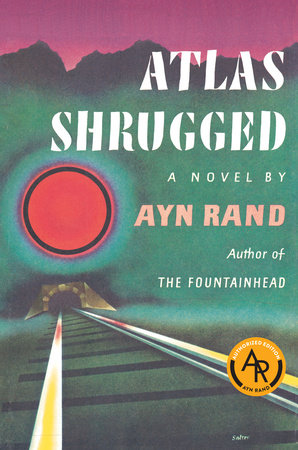I will begin my analysis and comparison of Emerson and Rand’s writings by introducing Ayn Rand the individual as well as the philosophy she developed, known as Objectivism. While there will be a few biographic details provided for context, my purpose is more to define and explore Rand’s claims and worldview than to provide a linear narrative for her life.
Ayn Rand was born in Russia in 1905 and first traveled to the United States as a young adult, after the Bolshevik revolution. Rand deeply resented Soviet communism and quickly took to life in America, finding a husband and career success as a screenwriter before becoming a full-fledged citizen in 1931 (Duignan, “Ayn Rand”).
Rand first began to probe into philosophical questions through her work as a novelist, specifically her two most well-known works, The Fountainhead (1943) and Atlas Shrugged (1957). Both novels feature main characters who are staunch individualist entrepreneurs, eschewing conformity in favor of absolute creativity in service of the individual. The traits that make up the substance of these characters (individualism, entrepreneurship, selfishness) will later be developed and integrated with other ideas to create a coherent philosophical system that would come to be known as Objectivism.
But the items listed above are only a few pieces of the complex puzzle that make up the Objectivist philosophy, though they are deeply relevant to its main tenets, which Rand herself describes in The Voice of Reason (1988):
1. Metaphysics: Objective Reality
2. Epistemology: Reason
3. Ethics: Self-interest
4. Politics: Capitalism. (3)
According to the narrative supported by these foundational ideas, reality is absolute and is determined by concrete facts. Reason consists of information gleaned and processed through man’s senses; it is the only way for man to perceive reality (Rand 4). Additionally, the moral purpose for man’s life is to serve his own interests; man is not meant to live for others, but only for himself. In this philosophy that prioritizes the interests of the individual, the morality of “altruism” or the selfless concern for the well-being of others, is abhorred. And finally, in an ideal Objectivist world, government would be minimal and its primary purpose would be to protect individual rights. A laissez-faire capitalist economic system would allow men to work with one another through a “free, voluntary exchange to mutual benefit,” (Rand 4).
The Objectivist approach to government, individualism, perception and reason in particular piqued my interest in terms of their possible relation to the work of Ralph Waldo Emerson, and the following posts will delve deeper into evaluating those connections.
Works cited:
Duignan, Brian. “Ayn Rand.” Encyclopædia Britannica, Encyclopædia Britannica, Inc., 27 Feb. 2018, www.britannica.com/biography/Ayn-Rand.
Rand, Ayn. The Voice of Reason: Essays in Objectivist Thought. NAL, 1988.



